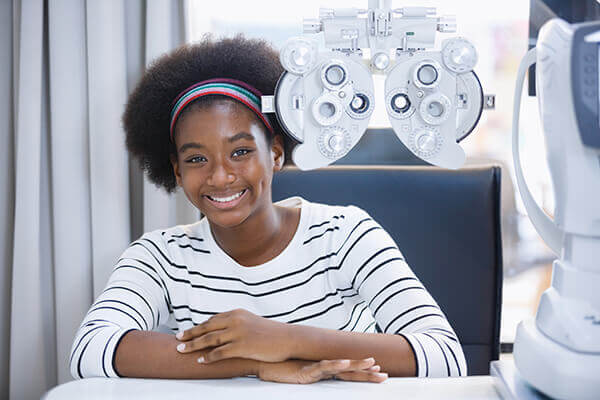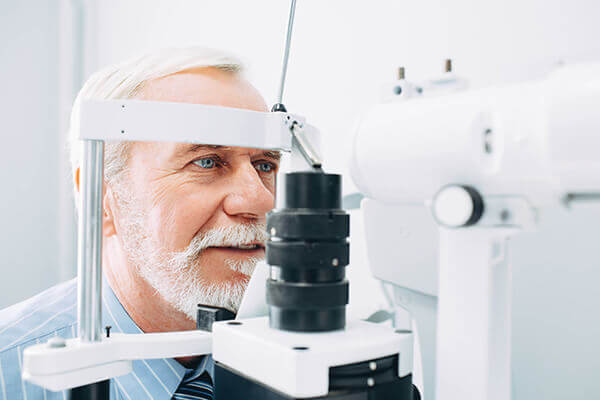Eye Exams

At Kresloff Eye Associates, we believe that healthy eyes are essential for a fulfilling life. Our eye doctors perform comprehensive eye exams to assess and help preserve your vision, as well as detect and prevent potential eye problems.
What Can I Expect During an Eye Exam?
During an eye exam, your eye doctor will thoroughly evaluate your visual acuity, eye health, and total visual function. First, they will review your medical history and ask you about any symptoms or issues you may be having.
Next, they will perform a number of tests to evaluate your vision. These tests include a visual acuity test to determine the clarity of your vision and a confrontational visual field test to identify any blind spots or other issues in your peripheral vision.
In some cases, they will also test color vision. In order to look for any indications of eye conditions like glaucoma or cataracts, your eye doctor will also inspect the intricate structures of your eyes using a specialized microscope called a slit lamp.
Your eye coordination and eye muscle movement will also be evaluated. Your eye doctor may also perform additional tests, such as a retinal imaging or OCT scan, based on your particular needs.
If you need corrective glasses, your doctor will also perform a refraction test to determine your prescription. After they have conducted a thorough evaluation, your eye doctor will go over their results with you and suggest any required follow-up care to help keep your eyes healthy.
How Often Should I Have an Eye Exam?
Regular eye exams help to ensure that you are maintaining clear vision and can allow for the early detection of certain eye conditions. Factors such as age, general health, and any existing eye conditions will affect how frequently eye exams are advised.
It is recommended that children have a thorough eye exam at six months old, another at three, and just before they start school. Unless their eye doctor advises differently, kids should undergo an eye checkup every one to two years.
Every two to three years, adults between the ages of twenty and thirty-nine who have healthy eyes should get their eyes checked. People forty to sixty-four should get their eyes checked every one to two years, and those sixty-five and older should get their eyes checked annually or as often as their eye doctor advises.
If you have certain eye or health conditions, such diabetes or glaucoma, your eye doctor may recommend more frequent eye exams. If you experience eye pain or notice any changes in your vision, don’t wait until your next scheduled eye exam; call your eye doctor right away.
What Should I Ask My Eye Doctor During My Eye Exam?

During an eye exam, it’s best to ask your eye doctor about any questions or concerns you may have regarding your eye health. First, it’s important to inquire about how often you should have your eyes examined, as this will vary depending on your age, medical history, and other factors.
You should also ask about any changes in your vision and what might be causing them. Your eye doctor can evaluate any changes in your vision and provide you with information on what the root cause could be.
In addition, you can ask your eye doctor for advice on lifestyle changes such as diet or exercise that may help preserve your vision. They can also determine if you need glasses or contacts and recommend the best type for your needs.
It’s also essential to ask your eye doctor about any eye conditions that you may be at risk for and to describe any necessary preventative measures that you may be able to take. Furthermore, during your eye exam, your doctor can check for signs of other health conditions, such as diabetes or high blood pressure.
Lastly, it’s important to ask if there are any changes to your eye prescription or corrective lenses that need to be made. Your eye doctor can evaluate your current prescription and make any necessary adjustments.
Remember, your eye doctor is there to help you maintain good eye health and address any concerns you may have, so don’t be afraid to ask questions during your exam.
What Common Eye Conditions Can Be Detected During an Eye Exam?
During an eye exam, several common eye conditions can be detected. Your eye doctor is able to determine if you have a refractive error, such as nearsightedness, farsightedness, and astigmatism, during an eye exam.
Refractive errors can often be easily corrected with glasses, contact lenses, or refractive surgery. Cataracts, a clouding of the lens in the eye that causes blurry vision, are also often easily detected during eye exams.
When first diagnosed, symptoms of cataracts may be mild. However, eventually, cataract surgery will be necessary to restore your vision.
Glaucoma, a group of eye diseases that can cause optic nerve damage and vision loss, can also be detected during an eye exam. Treatment for glaucoma often includes eye drops, laser procedures, or glaucoma surgery.
Eye doctors can also detect age-related macular degeneration, a condition that affects the central part of the retina and may cause blurry or distorted vision. Treatment for this eye condition often involves injections, laser therapy, or medication.
Dry eye syndrome is another common eye condition that can be detected during a routine eye exam. Those who have dry eyes have eyes that do not produce enough tears.
Regular eye exams are important to detect these and other eye conditions early, allowing for early treatment and preservation of vision.
Is it time for you to have an eye exam? Schedule an appointment at Kresloff Eye Associates in Collingswood, NJ, today!
